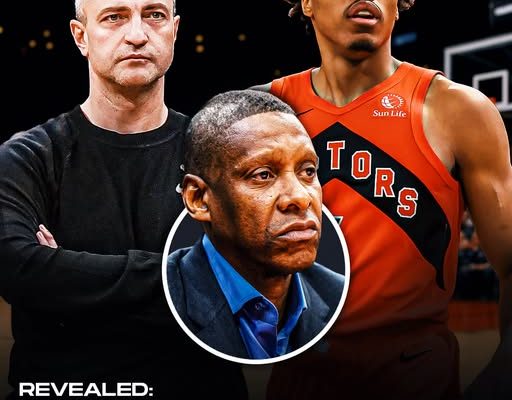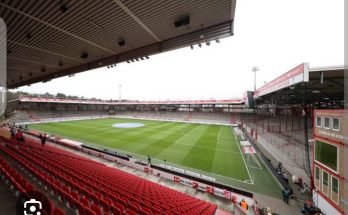There is reportedly a favorite to replace Masai Ujiri as the Toronto Raptors’ next team president, and the news has stirred not just local fans in Canada, but also NBA insiders across the league. After more than a decade of service that saw the Raptors transform from perennial mediocrity to champions under Ujiri’s leadership, his rumored departure marks the end of an era. With that, the conversation has swiftly shifted to what comes next and, more critically, who comes next. According to multiple league sources and whispers from within Toronto’s front office, the Raptors may already be zeroing in on a top candidate—someone with a pedigree in team-building, modern basketball vision, and perhaps most importantly, a willingness to step into the shadow of a legend.
Ujiri’s legacy is untouchable in Toronto. From the moment he arrived in 2013, brought in from the Denver Nuggets after earning Executive of the Year honors, he wasted little time remaking the roster and changing the team’s culture. He orchestrated bold moves—trading away franchise cornerstone DeMar DeRozan for Kawhi Leonard and hiring Nick Nurse to replace the successful but stagnant Dwane Casey. These weren’t easy or universally popular decisions at the time, but they proved visionary, culminating in the Raptors’ 2019 NBA Championship. Ujiri became more than just a team executive in Canada; he became a national sports icon and a symbol of excellence and courage in leadership. So when a position like that opens—or is expected to open—the bar for replacing him is astronomically high.
This makes the reported favorite to take the helm even more fascinating. Though the Raptors have yet to officially announce any changes or even acknowledge Ujiri’s possible exit, insiders believe the organization has already initiated preliminary succession plans. Leading the pack of potential replacements is none other than Bobby Webster, the Raptors’ current general manager and Ujiri’s right-hand man for years. The notion makes sense. Webster, just 39 years old, has been integral to every key decision the franchise has made since Ujiri’s arrival and was the architect of many of the Raptors’ best contracts and draft-day steals. He understands the organization from top to bottom and has developed a respected reputation across league offices for his acumen in salary cap navigation, player evaluation, and team building.
But Webster is not the only candidate under serious consideration. A new name has recently gained traction—Trajan Langdon, the current general manager of the New Orleans Pelicans. Langdon has built an impressive résumé in a relatively short span of time, combining playing experience, front-office know-how, and a progressive basketball mind. His tenure in New Orleans has shown flashes of brilliance, especially in acquiring value through trades and the draft, and insiders say his philosophy on team construction aligns closely with Toronto’s basketball values. Langdon is considered by many league executives to be a rising star in front office circles, and Toronto’s interest in him reflects both ambition and strategy.
That being said, the emotional and symbolic gravity of replacing Ujiri cannot be overstated. Whoever takes over the president’s role will not simply be judged on their transactions or win-loss record but on how effectively they carry the torch of a cultural and organizational ethos built painstakingly over a decade. That culture, marked by internationalism, player development, and bold decision-making, has made the Raptors one of the most respected franchises in the league. It’s why the favorite to succeed Ujiri must not only be analytically sharp and strategically sound but also possess an innate sense of how the Raptors connect with their city and country.
This adds another dimension to the consideration of potential internal promotion. Webster, being so closely tied to the Ujiri regime, would ensure continuity. He is familiar with the staff, players, and even the wider community programs that have become part of the Raptors’ identity. Promoting him would send a message that the Raptors intend to honor Ujiri’s legacy by evolving within the structure he built, not dismantling it. It also minimizes disruption—a key consideration for a team already in a transitional phase roster-wise. The Raptors are coming off back-to-back underwhelming seasons and are in the early stages of a youth-focused rebuild. A seamless executive transition would likely aid player development and maintain organizational stability.
Still, Langdon presents an exciting outsider option. A native of Alaska, a former Duke University star, and a EuroLeague veteran, he brings a worldly basketball experience that mirrors Toronto’s diverse identity. His time with the Brooklyn Nets as an assistant general manager under Sean Marks, during their successful turnaround phase, gives him valuable experience working within a rebuild—something the Raptors now face. Langdon’s eye for international talent could also restore Toronto’s pipeline to Europe and Africa, which was a hallmark of Ujiri’s era. Additionally, Langdon is known to prioritize culture-fit in personnel decisions, a trait that aligns perfectly with what Raptors ownership desires in a team president.
Ownership’s role in this succession cannot be understated. Maple Leaf Sports & Entertainment (MLSE), the conglomerate that owns the Raptors, is acutely aware of how much Ujiri means to fans and how his departure could be perceived as a signal of regression. Their decision must be both competitive and politically savvy. Replacing a beloved figure like Ujiri is not just about wins and losses—it’s about maintaining trust and hope. Reports suggest MLSE has already met with multiple candidates quietly, perhaps preparing for the possibility that Ujiri could move on to an NBA ownership group, a league office job, or even international humanitarian ventures, all of which he has long shown interest in.
Ujiri himself has been cryptic about his future, which only fuels the speculation. In recent public appearances, he’s continued to speak passionately about the game, the Raptors, and the future of African basketball, but has stopped short of explicitly committing to a long-term stay in Toronto. The franchise’s recent slide in the standings, as well as the departure of players like Fred VanVleet and OG Anunoby, may be influencing his mindset. At 54, Ujiri has little left to prove in terms of team building. It’s plausible he seeks new challenges that allow him to scale his impact beyond one NBA team.
All of this places immense importance on the decision at hand. The Raptors cannot afford to get it wrong. Their next team president must be someone who understands not just the mechanics of building a contender, but the cultural and symbolic role the Raptors play as Canada’s only NBA team. In this regard, both Bobby Webster and Trajan Langdon offer compelling but different visions. Webster brings continuity, familiarity, and quiet competence. Langdon brings fresh ideas, an international outlook, and high upside. The favorite may currently be Webster by virtue of proximity and organizational trust, but Langdon’s growing presence in discussions suggests the Raptors are willing to think creatively, just as they did when they originally hired Ujiri.
Fans are watching closely. Toronto is a basketball city now—its 2019 title forever changed the fan base. Expectations are higher. Tolerance for mediocrity is lower. A wrong step could undo years of goodwill and momentum. The Raptors are also competing in a conference where front offices are smarter and more aggressive than ever. Just surviving the Eastern Conference’s arms race will require boldness, strategic clarity, and cultural intelligence. In that sense, the search for Ujiri’s replacement is more than just an executive shuffle—it’s a test of vision.
There is also the practical challenge of timing. If Ujiri does announce his departure before the end of the year, the Raptors will need to move quickly. Training camp opens in early fall. The NBA calendar waits for no one. There are contracts to be negotiated, draft picks to be evaluated, and coaching decisions to finalize. Whoever steps in will need to hit the ground running, which is yet another point in favor of someone like Webster, who already understands the machinery of the Raptors’ ecosystem.
Ultimately, no candidate will fully replace Ujiri in the hearts of fans. His imprint on the team is indelible. He gave the Raptors credibility, courage, and a championship. But the right successor can carry that legacy forward while writing their own chapter in the team’s evolution. Right now, it appears Bobby Webster has the inside track, but don’t be surprised if the Raptors pivot toward a bold, outside-the-box hire like Trajan Langdon. In typical Raptors fashion, the final decision will likely be strategic, unorthodox, and daring—just like the man they are preparing to replace.



